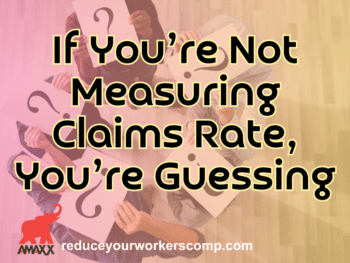Communication Can Be Significant Problem
Self-insured employers unintentionally, but routinely, sabotage the results they get on their workers’ compensation claims from their third party administrator (TPA) adjusters. Of course self-insured employers do not set out to get sub-par results from the adjusters. And, it should be understood that most TPA adjusters want to provide quality claims handling.
Click Link to Access Free PDF Download
“How Do I Get My Adjusters To Follow My Account Handling Instructions?”
Improve Communications With These Recommendations:
- Talk to your adjuster regularly to understand what is being done, and what needs to be done, on the larger work comp claims they are handling for you
- Be ready to offer input, but don’t try to micromanage the claim handling
- Provide all necessary supporting documentation as quickly as possible including Employer’s First Report of Injury, payroll records, pre-employment physicals and health questionnaires, personnel file, etc.
- Don’t surprise the adjuster with critical information that you have, or become aware of, by not providing it to the adjuster timely.
- If you become aware of any new information on the claim, share it immediately with the adjuster. If you do not, the adjuster will more than likely spend time acquiring the information you already have
- Let the adjuster(s) know how you prefer to communicate – whether you prefer emails over phone calls, or phone calls rather than e-mails
- Strive for timely response to all e-mails and to timely return all missed phone calls
- Let your adjusters know you expect a team approach to the claims handling and show respect for the work the adjuster does to create mutual respect
- Be consistent in your communications of your claims handling philosophy in regards to claims handling. Don’t take a hard nose, defend at all cost approach to one claim and on the next nearly identical claim, overpay the claim to get rid of it.
- Be consistent in your claims handling philosophy or the adjuster will quickly decide you ‘don’t know what you want’
- Never let your personal like or dislike of a particular employee influence your guidance to the adjuster on a claim
- Discuss with your adjuster how much a particular claim is worth and what you will be willing to pay to settle the claim. If you withhold what you are really willing to pay on the claim, then at time of the mediation or hearing, up the ante significantly, the adjuster is going to wonder why you had both the defense attorney and him/herself spend needless hours working on the claim that could have been settled much earlier
- Don’t change your evaluation of a claim unless new, pertinent information that was not previously known comes to light
- With an eye toward improving your relationship with the adjuster(s) ask your adjuster(s) what can be done to improve the communications between your company and them. Then, be willing to listen to constructive criticism and act on what is said. If you are not self-critical and not willing to acknowledge the adjuster’s input, then asking them how to improve communications will not benefit either of you
- If you see an adjuster making the same mistake over and over, communicate with the adjuster about the problem, ask the adjuster how the problem can be corrected, agreed on how the issue will be handled in the future, and then follow up to be sure the adjuster makes the necessary correction(s)
Be aware that every adjuster works differently, and every adjuster is under organizational pressure to accomplish as much as possible on many other claims. Show your willingness to work with and to assist the adjuster in getting the work comp claim resolved. Treat the adjuster will respect and communicate your desires to get the best possible claims handling.
Author Rebecca Shafer, JD, President of Amaxx Risk Solutions, Inc. is a national expert in the field of workers compensation. She is a writer, speaker, and publisher. Her expertise is working with employers to reduce workers compensation costs, and her clients include airlines, healthcare, printing/publishing, pharmaceuticals, retail, hospitality, and manufacturing. She is the author of the #1 selling book on cost containment, Workers Compensation Management Program: Reduce Costs 20% to 50%. Contact:RShafer@ReduceYourWorkersComp.com.
Editor Michael B. Stack, CPA, Director of Operations, Amaxx Risk Solutions, Inc. is an expert in employer communication systems and part of the Amaxx team helping companies reduce their workers compensation costs by 20% to 50%. He is a writer, speaker, and website publisher. www.reduceyourworkerscomp.com. Contact: mstack@reduceyourworkerscomp.com.
©2012 Amaxx Risk Solutions, Inc. All rights reserved under International Copyright Law.



























